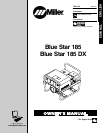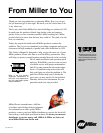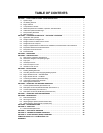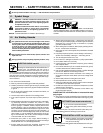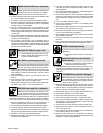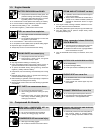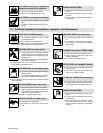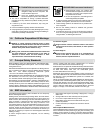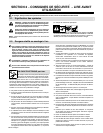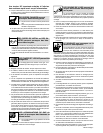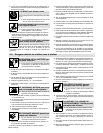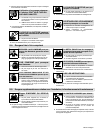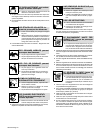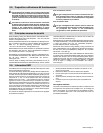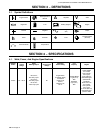
OM-4415 Page 3
1-3. Engine Hazards
BATTERY EXPLOSION can BLIND.
D Always wear a face shield, rubber gloves, and
protective clothing when working on a battery.
D Stop engine before disconnecting or connect-
ing battery cables or servicing battery.
D Do not allow tools to cause sparks when working on a battery.
D Do not use welder to charge batteries or jump start vehicles.
D Observe correct polarity (+ and −) on batteries.
D Disconnect negative (−) cable first and connect it last.
FUEL can cause fire or explosion.
D Stop engine and let it cool off before checking or
adding fuel.
D Do not add fuel while smoking or if unit is near
any sparks or open flames.
D Do not overfill tank — allow room for fuel to expand.
D Do not spill fuel. If fuel is spilled, clean up before starting engine.
D Dispose of rags in a fireproof container.
D Always keep nozzle in contact with tank when fueling.
MOVING PARTS can cause injury.
D Keep away from fans, belts, and rotors.
D Keep all doors, panels, covers, and guards
closed and securely in place.
D Stop engine before installing or connecting unit.
D Have only qualified people remove doors, panels, covers, or
guards for maintenance and troubleshooting as necessary.
D To prevent accidental starting during servicing, disconnect
negative (−) battery cable from battery.
D Keep hands, hair, loose clothing, and tools away from moving
parts.
D Reinstall doors, panels, covers, or guards when servicing is
finished and before starting engine.
D Before working on generator, remove spark plugs or injectors to
keep engine from kicking back or starting.
D Block flywheel so that it will not turn while working on generator
components.
HOT PARTS can cause severe burns.
D Do not touch hot parts bare handed.
D Allow cooling period before working on equip-
ment.
D To handle hot parts, use proper tools and/or
wear heavy, insulated welding gloves and
clothing to prevent burns.
STEAM AND HOT COOLANT can burn.
D If possible, check coolant level when engine is
cold to avoid scalding.
D Always check coolant level at overflow tank, if
present on unit, instead of radiator (unless told
otherwise in maintenance section or engine
manual).
D If the engine is warm, checking is needed, and there is no over-
flow tank, follow the next two statements.
D Wear safety glasses and gloves and put a rag over radiator cap.
D Turn cap slightly and let pressure escape slowly before
completely removing cap.
Using a generator indoors CAN KILL
YOU IN MINUTES.
D Generator exhaust contains carbon monoxide.
This is a poison you cannot see or smell.
D NEVER use inside a home or garage, EVEN IF
doors and windows are open.
D Only use OUTSIDE and far away from windows, doors, and
vents.
BATTERY ACID can BURN SKIN and EYES.
D Do not tip battery.
D Replace damaged battery.
D Flush eyes and skin immediately with water.
ENGINE HEAT can cause fire.
D Do not locate unit on, over, or near combustible
surfaces or flammables.
D Keep exhaust and exhaust pipes way from
flammables.
EXHAUST SPARKS can cause fire.
D Do not let engine exhaust sparks cause fire.
D Use approved engine exhaust spark arrestor in
required areas — see applicable codes.
1-4. Compressed Air Hazards
BREATHING COMPRESSED AIR can
cause serious injury or death.
D Do not use compressed air for breathing.
D Use only for cutting, gouging, and tools.
COMPRESSED AIR can cause injury.
D Wear approved safety goggles.
D Do not direct air stream toward self or others.
TRAPPED AIR PRESSURE AND WHIPPING
HOSES can cause injury.
D Release air pressure from tools and system be-
fore servicing, adding or changing attach-
ments, or opening compressor oil drain or oil fill
cap.



